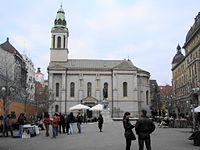Religion in Croatia
This article needs additional citations for verification. (March 2009) |
Religion in Croatia (2011 census[1])

The most widely professed religion in Croatia is Christianity and a large majority of the Croatian population declares themselves as members of the Roman Catholic Church. Croatia has no official religion and Freedom of religion is a right defined by the Constitution of Croatia, which also defines all religious communities as equal in front of the law and separate from the state.
Demographics
According to the 2011 census 86.28% of Croatians are Roman Catholics, while Orthodox Christians make up 4.44% of the population, Muslims 1.47 %, and Protestants 0.34% of the population. 3.81% of Croatians are not religious and atheists, 0.76% are agnostics and sceptics, and 2.17% are undeclared.[2] In the Eurostat Eurobarometer Poll of 2005, 67% of the population of Croatia responded that "they believe there is a God". In a 2009 Gallup poll, 70% answered yes to the question "Is religion an important part of your daily life?".[3] However only 17.3% of the population attends religious services regularly.[4]
Interaction between religious and secular life


Public schools allow religious teaching in cooperation with religious communities having agreements with the state, but attendance is not mandated. Religion classes (Croatian: vjeronauk) are organized widely in public elementary and secondary schools, most commonly coordinated with the Catholic Church.
The public holidays in Croatia also include the religious festivals (Croatian: blagdan) of Epiphany, Easter Monday, Corpus Christi Day, Assumption Day, All Saints' Day, Christmas, and St. Stephen's or Boxing Day. The primary holidays are based on the Catholic liturgical year, but other believers are legally allowed to celebrate other major religious holidays.
Marriages conducted by the religious communities having agreements with the state are officially recognized, eliminating the need to register the marriages in the civil registry office.
Denominations
The Roman Catholic Church in Croatia receives state financial support and other benefits established in concordats between the Government and the Vatican. The concordats and other government agreements with non-Roman Catholic religious communities allow state financing for some salaries and pensions for religious officials through government-managed pension and health funds.[5]
The concordats and agreements also regulate public school catechisms and military chaplains.[5]
In line with the concordats signed with the Roman Catholic Church and in an effort to further define their rights and privileges within a legal framework, the government has additional agreements with the following 14 religious communities:[5] [6]
- Serb Orthodox Church (SPC)
- Islamic Community of Croatia
- Evangelical Church
- Reformed Christian Church in Croatia
- Protestant Reformed Christian Church in Croatia
- Pentecostal Church
- Union of Pentecostal Churches of Christ
- Seventh-day Adventist Church
- Union of Baptist Churches
- Church of God
- Church of Christ
- Reformed Movement of Seventh-day Adventists
- Bulgarian Orthodox Church
- Macedonian Orthodox Church
- Croatian Old Catholic Church
Legal status
The 2002 Law on the Legal Position of Religious Communities broadly defines religious communities' legal positions and covers such matters as government funding, tax benefits, and religious education in schools. Matters such as pensions for clergy; religious service in the military, penitentiaries, and police; and recognition of religious marriages are left to each religious community to negotiate separately with the Government.[5]
Registration of religious groups is not obligatory; however, registered groups are granted "legal person" status and enjoy tax and other benefits. The law stipulates that to be eligible for registration, a religious group must have at least 500 believers and be registered as an association for 5 years. All religious groups in the country prior to passage of the law in 2002 were registered without having to meet these conditions; religious groups new to the country after passage of the law must fulfill the requirements for the minimum number of believers and time as an association. Religious groups based abroad must submit written permission for registration from their country of origin.[5] Minister of Public Administration runs a Registry of religious organizations in Republic of Croatia, currently recognizing 62 religious communities (as of 2013[update]).[7]
See also
- Roman Catholicism in Croatia
- Orthodoxy in Croatia
- Protestantism in Croatia
- Islam in Croatia
- History of the Jews in Croatia
- Buddhism in Croatia
- Slavic Neopaganism
- Irreligion in Croatia
References
- ^ "Population by Religion, by Towns/Municipalities, 2011 Census". Census of Population, Households and Dwellings 2011. Zagreb: Croatian Bureau of Statistics. December 2012. Retrieved 2014-02-15.
- ^ "Population by Religion, by Towns/Municipalities, 2011 Census". Census of Population, Households and Dwellings 2011. Zagreb: Croatian Bureau of Statistics. December 2012. Retrieved 2014-02-15.
- ^ "Gallup Global Reports". Gallup. Archived from the original on 2013-10-14. Retrieved 2013-10-07.
- ^ Bešker, Inoslav (28 December 2012). "Ne idemo redovito u crkvu, ali se Bogu često molimo" [We do not go to church regularly, but we pray to God frequently] (in Croatian). jutarnji.hr. Retrieved 16 November 2016.
- ^ a b c d e ""Croatia Religion" - Electronic version". CountryReports. 2009. Retrieved September 26, 2009.
- ^ "Articles in NN196/03, including five contracts with ten religious communities". Narodne novine - Službeni list Republike Hrvatske (in Croatian). Narodne novine. December 15, 2003. Retrieved February 16, 2010.
- ^ "Evidencija vjerskih zajednica u Republici Hrvatskoj" (in Croatian). Ministry of Public Administration. Archived from the original on 2014-07-14. Retrieved 2013-10-07.
External links
- Registry of Religious Communities, Ministry of Public Administration, Government of the Republic of Croatia Template:Hr icon
